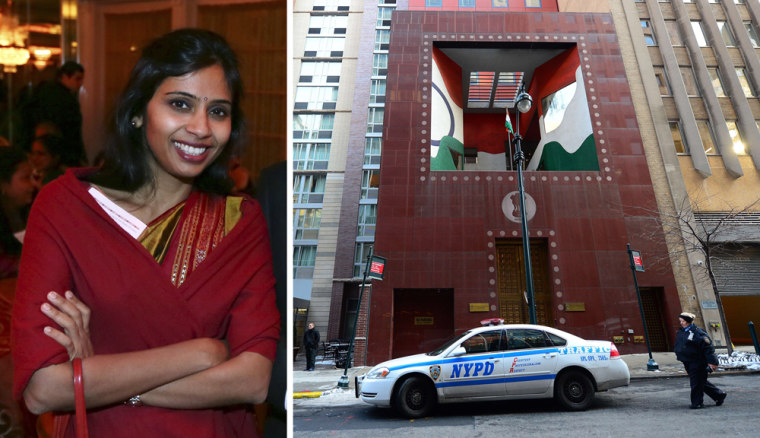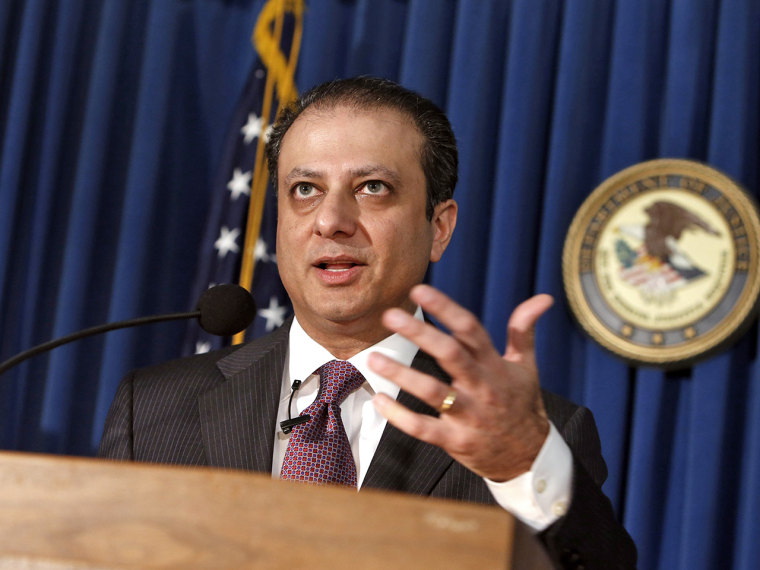
India gave a diplomat charged with visa fraud a new job in the hopes of securing immunity for her, but the State Department said Thursday that the gambit won't work.
Devyani Khobragade — the deputy consul who was arrested and strip-searched, sparking an international spat — was transferred to a new role at the Permanent Mission of India to the United Nations in New York, officials told NBC News.
"She will represent India at the U.N., and from what we are aware of the diplomatic privileges of the delegates to the U.N. we are sure she will get this [immunity]," foreign ministry spokesman Syed Akbaruddin said.
State Department spokesman Marie Harf said the agency had not received a request for status change from India, but that even if it were granted, the immunity would start at that point.
“It is not retroactive,” Harf said at a briefing.
Because Khobragade, 39, was consular staff when she was arrested, and not an ambassador, she only had consular immunity, which covers acts directly connected to her business and not unrelated offenses, U.S. officials have said.
A State Department handbook for law-enforcement, however, seems to suggest that once a person has criminal immunity they can't be prosecuted, even for prior acts.
"Immunity attaches to the person," said Daniel Arshack, Khobragade's lawyer.
Federal prosecutors in Manhattan have charged Khobragade with visa fraud and making a false statement in connection with the hiring of a housekeeper and babysitter from her homeland to work in New York City.
She allegedly told the U.S. Embassy the worker, Sangeet Richard, would be paid $4,500 a month — then had her sign a secret contract that paid $3.31 an hour, in violation of American rules that require visa holders be paid minimum wage.
Prosecutors also say that the maid complained Khobragade paid her even less than $3.31, verbally abused her, took away her passport and told her she had no choice but to continue working under those conditions.
Indian lawmakers have reacted with fury to Khobragade's arrest, calling her treatment "humiliating," "despicable" and "barbaric" and alleging she was cavity searched.
The Indian government retaliated by removing security barriers at the U.S. Embassy in New Delhi and revoking the privileges of American diplomats in India. There have also been several anti-American protests outside the U.S.'s diplomatic buildings in the subcontinent.

It was against that backdrop that Secretary of State John Kerry called Indian's national security adviser Shivshanker Menon on Wednesday to say that while it's important for the U.S. to enforce its laws, he "regrets that certain courtesies were not extended in this case," State Department spokeswoman Marie Harf said.
But just a few hours after Kerry's fence-mending effort, the prosecutor who charged Khobragade, Manhattan U.S. Attorney Preet Bharara issued an extraordinary, detailed defense of his handling of the case, slamming his critics.
"This Office’s sole motivation in this case, as in all cases, is to uphold the rule of law, protect victims, and hold accountable anyone who breaks the law – no matter what their societal status and no matter how powerful, rich or connected they are," he said.
“One wonders why there is so much outrage about the alleged treatment of the Indian national accused of perpetrating these acts, but precious little outrage about the alleged treatment of the Indian victim and her spouse?” added Bharara, who happens to be of Indian descent.
He said Indian authorities had opened an investigation into Richard in an attempt to "silence" her, and her family had to be brought to the U.S. after they were intimidated at home.
India’s foreign minister, however, portrayed Richard — whose father-in-law has worked for a U.S. diplomat stationed in New Delhi — as the villain and law-breaker and Khobragade as the victim of a "conspiracy."
Shri Salman Khurshid told parliament that the incident is the culmination of a months-long dispute between the two women. The housekeeper disappeared in June, and then through a lawyer demanded the diplomat secure her a full U.S. visa and a large amount of money as a "settlement," he alleged.
He said Khobragade registered a complaint of "aggravated harassment" against her former employee with the NYPD, but "no action was taken" by the force. The NYPD did not respond to requests for comment.
"It became clear at that point that this was a conspiracy by which some people had virtually trapped our official into a situation where she would have to do something illegal in order to help those people remain in the United States of America," Khurshid told lawmakers.
"It is not the illegality she is accused of, it is the illegality she refused to subject herself to that brought about this unfortunate situation upon her."
And on Thursday, a spokesman for the Indian embassy in Washington fired back at Bhrarara by accusing him of interfering in another democratic nation's legal process by “evacuating” Richard's family.
"We need to keep in mind the simple fact that there is only one victim in this case," the statement said. "That victim is Devyani Khobragade —a serving Indian diplomat on mission in the United States."
Khobragade, who was released on bail of $250,000 after giving up her passport, faces up to 15 years in prison if she is convicted.
Harf said the State Department was not pressuring Bharara to drop the charges and she declined to comment on the statement he issued Wednesday night.
"I'm not going to go line by line and parse a statement from the [prosecutor]," she said, adding, "It’s not a decision for us to prosecute or not."
But the State Department is clearly anxious to tamp down tensions with a key ally. Undersecretary Wendy Sherman spoke Thursday with India's foreign secretary about the matter.
"They had a good conversation," Harf said.
NBC News' Catherine Chomiak and Susan Kroll contributed to this story.
Related: